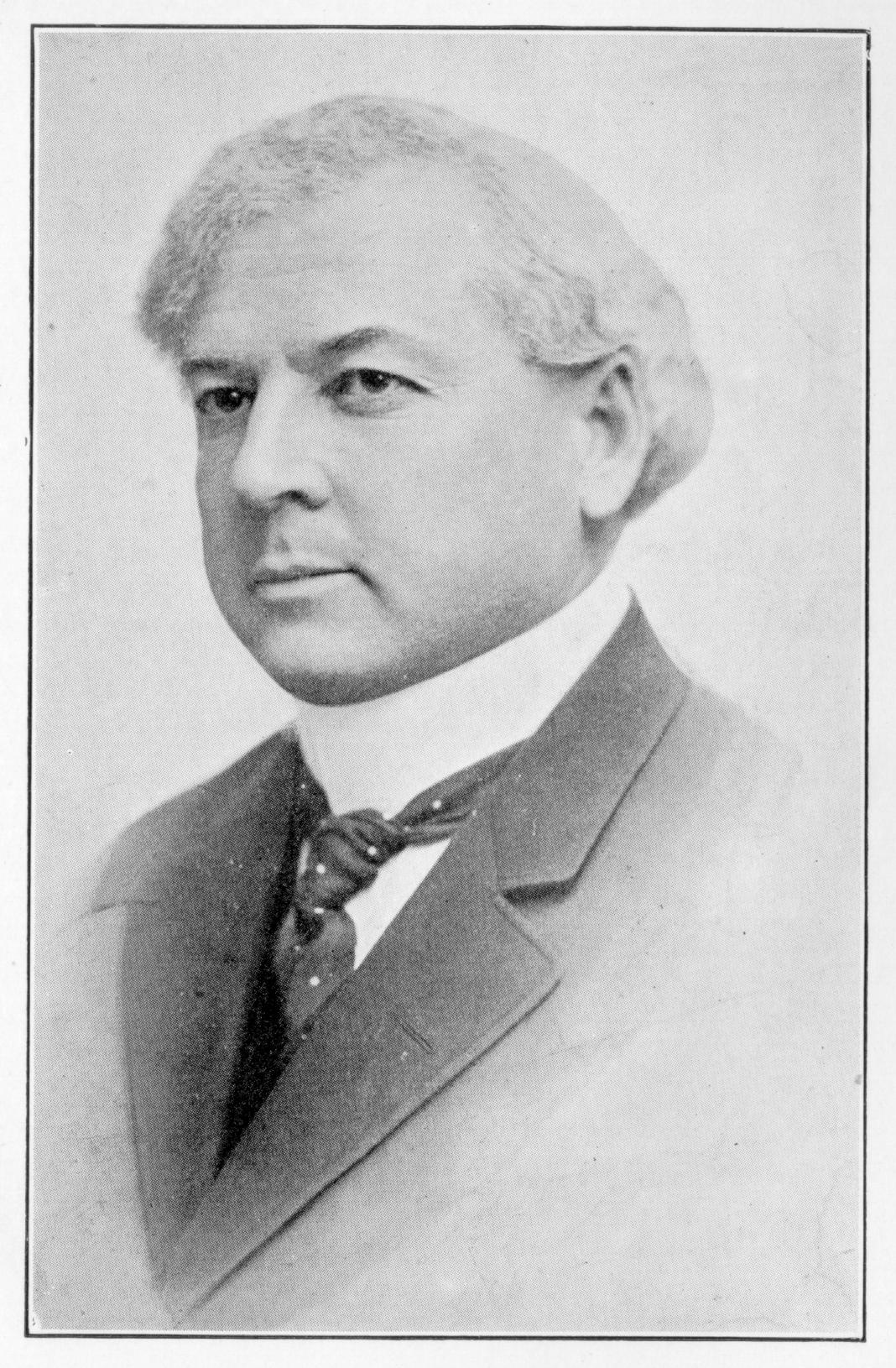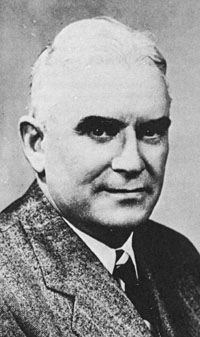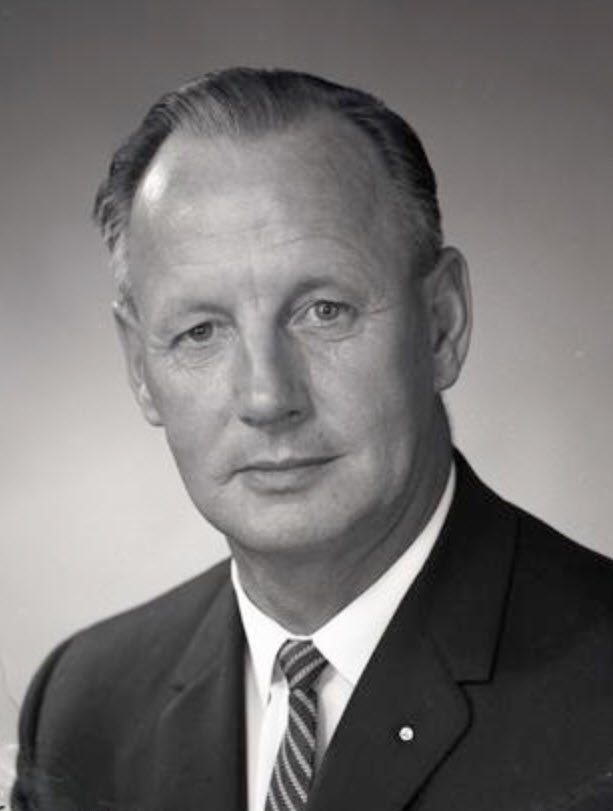|
Thomas Uphill
Thomas Hubert Uphill (June 26, 1874 – February 17, 1962) was a socialist politician in British Columbia. He served a long time as mayor of Fernie and also represented the riding of Fernie in the British Columbia Legislative Assembly for forty years, most of them as the legislature's sole Labour Party MLA. Early life Uphill was born in 1874 in Chewton Mendip, Somerset, England, the son of a farm labourer.1911 Census of Canada & 1881 UK Census After serving in the Second Boer War, he moved to Fernie, British Columbia in 1904 and became a life insurance salesman. He was a supporter of the trade union movement and served as secretary of the miners' union. In 1912 he was elected to city council and in 1915 he won his first election as mayor. Political career In the 1916 provincial election, Uphill ran for the legislature as a Conservative and was narrowly defeated. The wave of political radicalisation that followed World War I deepened Uphill's sympathy with the trade union ... [...More Info...] [...Related Items...] OR: [Wikipedia] [Google] [Baidu] |
Chewton Mendip
Chewton Mendip is a village and civil parishes in England, civil parish in Somerset, England. It is situated north of Wells, Somerset, Wells, south of Bath, Somerset, Bath and Bristol on the A39 road, A39 very close to the A37 road, A37. The village is in a valley on the Mendip Hills, is the source of the River Chew and is therefore on the edge of the Chew Valley. The parish includes the Hamlet (place), hamlets of Bathway and Green Ore. History There were several lead mines and stone quarries in the parish. It is also the site of Attborough Swallet (also known as Red Quar Swallet), a cave which is unusual for a cave on the Mendip Hills in that it is not in limestone but instead in Dolomite (mineral), Dolomitic Conglomerate (geology), Conglomerate and Marl. The cave was first entered in 1992. There is a long barrow to the north of the village by . Excavation in 1946 revealed six Bronze Age barrows below the crest of the Mendips. The shape of some of the existing fields sug ... [...More Info...] [...Related Items...] OR: [Wikipedia] [Google] [Baidu] |
British Columbia Conservative Party
The Conservative Party of British Columbia, commonly known as the BC Conservatives and colloquially known as the Tories, is a provincial political party in British Columbia, Canada. It is the main rival to the governing British Columbia New Democratic Party and forms the Official Opposition (Canada), Official Opposition in the Legislative Assembly of British Columbia. It is led by John Rustad, who was originally elected as a British Columbia Liberal Party MLA 2005 British Columbia general election, in 2005 before being expelled from the Liberal caucus in 2022. In the first half of the 20th century, the Conservatives competed with the British Columbia Liberal Party, BC Liberal Party for power in the province. During this period, three party leaders served as premier of British Columbia: Richard McBride (1903–1915), William John Bowser (1915–1916), and Simon Fraser Tolmie (1928–1933). Royal Maitland and Herbert Anscomb served as Deputy Premier of British Columbia, deputy prem ... [...More Info...] [...Related Items...] OR: [Wikipedia] [Google] [Baidu] |
Harold Winch
Harold Edward Winch (18 June 1907 – 1 February 1993) was a Canadian politician active with the Co-operative Commonwealth Federation (CCF) and its successor, the New Democratic Party (NDP). Winch was leader of the British Columbia CCF from 1938 to 1953, and Leader of the Opposition from October 1941 to February 1952 and then again from June 1952 to March 1953. He was called "the best leader of the Opposition that has ever been" by Premier W. A. C. Bennettbr> Winch was active during the Relief Camp Workers' Union, relief camp strike in Vancouver that precipitated the On-to-Ottawa Trek in 1935, acting as a liaison between unemployed protesters and the government. He performed the same role as a new MLA in 1938, and assisted the police in ending a month-long occupation at the Vancouver Art Gallery on what became known as "Bloody Sunday". Like other CCFers (such as Grace and Angus MacInnis), Winch and the BC CCF supported the internment of Japanese Canadians during World ... [...More Info...] [...Related Items...] OR: [Wikipedia] [Google] [Baidu] |
British Columbia Social Credit League
The British Columbia Social Credit Party was a conservative political party in British Columbia, Canada. It was the governing party of British Columbia for all but three years between the 1952 provincial election and the 1991 election. For four decades, the party dominated the British Columbian political scene, with the only break occurring between the 1972 and 1975 elections when the British Columbia New Democratic Party governed. Party members were known as Socreds. Although founded as part of the Canadian social credit movement, promoting social credit policies of monetary reform, the BC Social Credit Party later discarded the ideology and became a political vehicle for fiscal conservatives and later social conservatives in British Columbia. The party collapsed within one term of its 1991 defeat. It was not represented in the Legislative Assembly of British Columbia after 1996, and only existed in a nominal fashion after 2001. In 2013, the party was deregistered for failin ... [...More Info...] [...Related Items...] OR: [Wikipedia] [Google] [Baidu] |
Majority Government
A majority government is a government by one or more governing parties that hold an absolute majority of seats in a legislature. Such a government can consist of one party that holds a majority on its own, or be a coalition government of multiple parties. This is as opposed to a minority government, where the government doesn't have a majority, and needs to cooperate with opposition parties to get legislation passed. A government majority determines the balance of power. A government is not a majority government if it only has a majority when counting parties outside the government that have a confidence agreement with it. A majority government is usually assured of having its legislation passed and rarely if ever, has to fear being defeated in parliament, a state also known as a working majority. In contrast, a minority government must constantly bargain for support from other parties in order to pass legislation and avoid being defeated on motions of no confidence. Single- ... [...More Info...] [...Related Items...] OR: [Wikipedia] [Google] [Baidu] |
Hung Parliament
A hung parliament is a term used in legislatures primarily under the Westminster system (typically employing Majoritarian representation, majoritarian electoral systems) to describe a situation in which no single political party or pre-existing coalition (also known as an alliance or bloc) has an absolute majority of legislators (commonly known as members or seats) in a parliament or other legislature. This situation is also known as a balanced parliament, or—for Local government in the United Kingdom, local government in the United Kingdom—a parliament under no overall control (NOC). A hung parliament may result in a coalition government, a minority government, or a snap election if a government cannot be formed. In multi-party systems, particularly where proportional representation is employed, it is rare for a single party to hold a majority of the seats, and likewise rare for one party to form government on its own (i.e. coalition government is the norm). Consequently, th ... [...More Info...] [...Related Items...] OR: [Wikipedia] [Google] [Baidu] |
1952 British Columbia General Election
The 1952 British Columbia general election was the 23rd general election in the Canadian province of British Columbia. It was held to elect members of the Legislative Assembly of British Columbia, alongside a plebiscite on daylight saving time and liquor. The election was called on April 10, 1952, and held on June 12, 1952. The new legislature met for the first time on February 3, 1953. In 1951, the Legislative Assembly passed an act that allowed the use of preferential ballots in the next election. The voting system used was instant-runoff voting (IRV). The presence of multi-member districts, such as Victoria City with 3 MLAs, was handled by an innovation where the district's candidates were split into three "ballots", each with no more than one candidate from each party, with the member in each being elected by IRV. The voting age was also lowered from 21 to 19 prior to this election. Due to the preferential ballot and a large increase in SC support, the election resulted in ... [...More Info...] [...Related Items...] OR: [Wikipedia] [Google] [Baidu] |
Communist Party Of Canada
The Communist Party of Canada is a federal political party in Canada. Founded in 1921 under conditions of illegality, it is the second oldest active political party in Canada, after the Liberal Party of Canada. Although it does not currently have any parliamentary representation, the party's candidates have previously been elected to the House of Commons, the Ontario legislature, the Manitoba legislature, and various municipal governments across the country. The Communist Party of Canada focuses on contributing to the "labour and people's movements" through extra-parliamentary activity. Throughout its history, the party has made significant contributions to Canada's trade union, labour, and peace movements. The Communist Party of Canada participates in the International Meeting of Communist and Workers' Parties. In 1993, Elections Canada deregistered the party and seized its assets in accordance with changes to the '' Canada Elections Act'' introduced by the Conservative g ... [...More Info...] [...Related Items...] OR: [Wikipedia] [Google] [Baidu] |
1933 British Columbia General Election
The 1933 British Columbia general election was the eighteenth general election in the Province of British Columbia, Canada. It was held to elect members of the Legislative Assembly of British Columbia. The election was called on September 13, 1933, and held on November 2, 1933. The new legislature met for the first time on February 20, 1934. The Liberal Party won a majority government. The Official Opposition was formed by the social democratic Co-operative Commonwealth Federation, which was contesting its first election. Because of internal discord, the provincial executive of the Conservative Party decided not to contest the election officially. Instead, each local association was to act on its own. Some candidates ran as Independents, some as Independent Conservatives. Those supporting the premier, Simon Fraser Tolmie, ran as Unionist Party of British Columbia, and those grouped around William John Bowser, a former premier, ran as the Non-Partisan Independent Group. When B ... [...More Info...] [...Related Items...] OR: [Wikipedia] [Google] [Baidu] |
British Columbia NDP
The New Democratic Party of British Columbia (BC NDP) is a social democratic political party in British Columbia, Canada. The party sits on the centre-left of the political spectrum and is one of the two major parties in British Columbia; since the 1990s, its rival was the centre-right BC United (formerly known as the BC Liberals) until the Conservative Party of British Columbia reconstituted itself for the 2024 British Columbia general election, with BC United withdrawing its candidates and endorsing the Conservatives. The party is formally affiliated with the federal New Democratic Party and serves as its provincial branch. The party was established in 1933 as the provincial wing of the Co-operative Commonwealth Federation; the party adopted the NDP name in 1961 as part of the national party's re-foundation. The CCF quickly established itself as a major party in BC: for all but five years between 1933 and 1972, the CCF/NDP was the Official Opposition to the Liberal, Conserv ... [...More Info...] [...Related Items...] OR: [Wikipedia] [Google] [Baidu] |
Canadian Labour Party
The Canadian Labour Party (CLP) was an early, unsuccessful attempt at creating a national labour party in Canada. Although it ran candidates in the federal elections of 1917, 1921, 1925, and 1926, it never succeeded in its goal of providing a national forum for the Canadian labour movement. In Alberta, the CLP and its ally, the Dominion Labour Party, ran candidates in municipal elections and had some success. In most provinces, the CLP ceased to exist after 1928 or 1929. The later Co-operative Commonwealth Federation, forerunner of the modern NDP, largely filled the role of a "Labour Party" after its founding in 1932. History The CLP was founded in 1917, on the initiative of the Trades and Labour Congress of Canada (TLC). It was intended to be the Canadian equivalent of the British Labour Party and endorsed a variety of reformist labour initiatives. In this sense, it was ideologically closer to A. W. Puttee's original Winnipeg Labour Party than to the revolutionary Soc ... [...More Info...] [...Related Items...] OR: [Wikipedia] [Google] [Baidu] |
John Oliver (British Columbia Politician)
John Oliver (July 31, 1856 – August 17, 1927) was a British-Canadian politician and farmer, who served as the 19th premier of British Columbia. As a prominent figure in the province’s early political landscape, Oliver served in various capacities, including as leader of the Opposition and minister of Agriculture, and contributed significantly to the development of British Columbia’s agricultural and railway sectors. A member of the former British Columbia Liberal Party, Oliver was first elected to the provincial legislature in the 1900 provincial election. After serving as the leader of the Opposition, he lost his seat in 1909 but returned the legislature in the 1916 election. That year, he was appointed minister of Agriculture and minister of Railways in premier Harlan Carey Brewster's cabinet. Following Brewster's death in 1918, Oliver succeeded him as premier. In addition to his role as premier, Oliver held the portfolios of minister of Agriculture (1918), mini ... [...More Info...] [...Related Items...] OR: [Wikipedia] [Google] [Baidu] |



